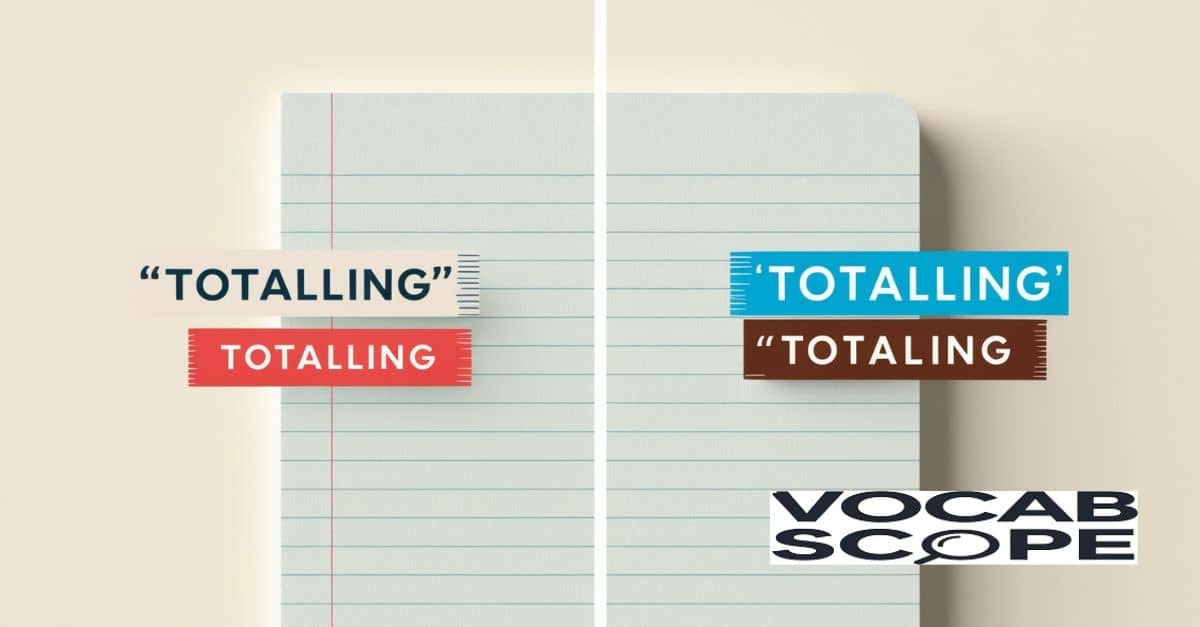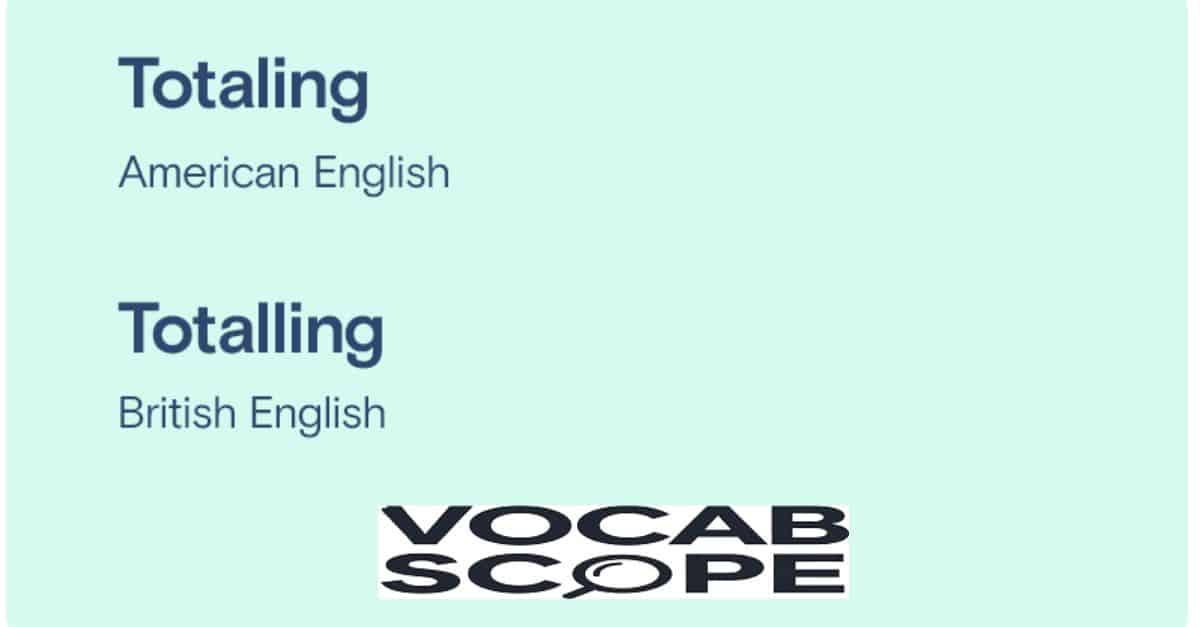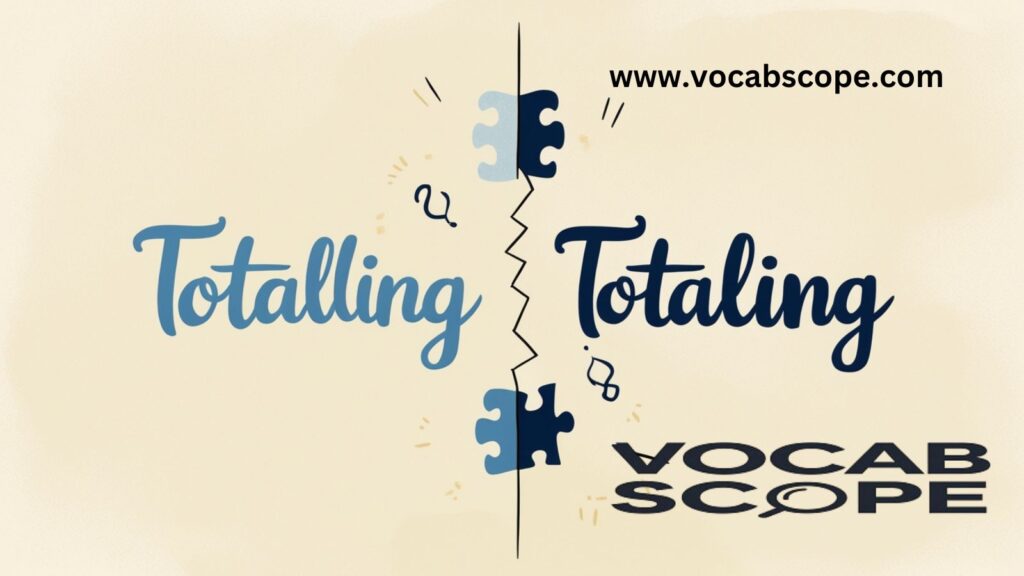“Totalling” and “totaling” are both correct spellings of the same word. The difference lies in their usage based on English variations. “Totalling” is used in British English, while “totaling” is preferred in American English.
When deciding between “totalling” and “totaling”, consider your audience. “Totalling” is common in British English, whereas “totaling” suits American English. Choosing the right spelling ensures clarity and consistency in your writing.
What do “Totalling” and “Totaling” Mean?
“Totalling” and “totaling” refer to the act of adding up numbers or amounts to reach a sum.
As a verb, they describe the process of summing or calculating a final total, like when you total your expenses for the month.
As a noun, “total” means the final amount or sum. For example, “The total was $50.”
As an adjective, “total” means complete or whole, such as in “total cost” or “total amount.”
The difference in spelling—“totalling” in British English and “totaling” in American English—is purely regional. Both have the same meanings but follow different spelling conventions.
Read About: Cacoon or Cocoon: Which Spelling is Correct?
Understanding the Difference: British English vs. American English

British English and American English often diverge in spelling conventions, causing confusion for writers. The difference between “totalling” and “totaling” is a prime example. In British English, the spelling “totalling” with a double “l” is the norm, while in American English, the single “l” version, “totaling,” is preferred.
- British English: Totalling
- American English: Totaling
This difference in spelling extends to several other words, such as “travelling” vs. “traveling” and “cancelling” vs. “canceling.” Understanding these differences is crucial, especially if you’re writing for an audience from a specific region.
“Totalling” or “Totaling”: What’s the Difference?
Here’s a concise breakdown of the spelling differences between British and American English for “totalling” and “totaling”:
| Feature | British English – “Totalling” | American English – “Totaling” |
| Spelling | Totalling | Totaling |
| Usage | Preferred in the UK, Australia, Canada, and other regions using British English standards | Preferred in the US and countries using American English standards |
| Doubling Consonants Rule | Typically doubles the consonant before adding “-ing” to words ending with a single vowel followed by a consonant | Generally does not double the consonant for words where the stress is not on the final syllable |
| Example Sentence | “She was totalling the expenses.” | “He was totaling the cost of the project.” |
A Tale of Two Spellings
Totalling (with two L’s) is the preferred spelling in British English. It follows the rule of doubling the final consonant when adding a suffix that begins with a vowel to a word ending in a single vowel followed by a single consonant.
Totaling (with one L) is the standard in American English. It adheres to the simpler rule of just adding the suffix without doubling the final consonant.
A Word on Pronunciation
Interestingly, despite the spelling difference, “totalling” and “totaling” are pronounced identically in both British and American English.
This shared pronunciation underscores the arbitrary nature of some spelling differences and reminds us that spoken language often evolves faster than written conventions.
Beyond Totalling and Totaling
This spelling split isn’t unique to our featured words. Many other words follow similar patterns:
- Travelled/Traveled
- Cancelled/Canceled
- Marvellous/Marvelous
- Jewellery/Jewelry
These variations highlight the importance of consistency in your writing style. Mixing British and American spellings in a single document can make your writing appear sloppy or confused.
Synonyms of “Totalling” or “Totaling”
- Adding up
- Summing up
- Calculating
- Computing
- Resulting in
- Amounting to
- Reaching
- Tallying
- Aggregating
- Constituting
Using “Totalling” and “Totaling” in Sentences

Totaling:
- The expenses for the month came in at $2,000, totaling more than we had budgeted.
- The team received donations totaling $5,000 for the charity event.
- His shopping cart was filled with items totaling over 50 pounds.
- She received a bonus totaling 10% of her annual salary.
- The invoices on the desk were totaling up to a significant amount.
- The project costs ended up totaling twice the original estimate.
- With additional fees, the final bill ended up totaling $250.
- The concert tickets, food, and travel expenses were totaling nearly $300.
- The company reported quarterly profits totaling $1.5 million.
- They made several small purchases, eventually totaling $100.
Totalling:
- The bill for the renovation work was totalling $8,000 by the end of the month.
- The donations collected during the fundraiser were totalling over $3,000.
- After reviewing all the receipts, the expenses for the trip were totalling $600.
- The annual membership fees are totalling $120 for each participant.
- Her sales commissions are totalling 15% of her total earnings this year.
- The fines for late library books are totalling $25.
- The costs of the project were totalling much more than initially projected.
- The total length of the four videos combined is totalling 45 minutes.
- The project’s final budget was totalling $50,000 after revisions.
- The team’s efforts have resulted in a monthly output totalling 1,000 units.
A Quick Recap on Totalling vs. Totaling
To sum up, the choice between “totalling” and “totaling” hinges on regional preference and spelling conventions:
British English prefers “totalling” with a double “l.”
American English opts for “totaling” with a single “l.”
Refer to style guides and consider your audience to make the appropriate choice.
Context Matters: Where You Should Use Each Spelling

The choice between “totalling” and “totaling” largely depends on the regional preference of your audience. However, it also depends on the style guides you might be following in your writing.
1. British English Usage
If you’re writing for an audience in the UK or any country where British English is the standard, you should use “totalling.”
This form adheres to British spelling conventions, which typically involve doubling the final consonant when adding suffixes like “-ing” to words ending in a single vowel followed by a consonant.
- Example: “She was totalling the expenses for the event to ensure accuracy.”
2. American English Usage
On the other hand, if your writing is aimed at an American audience, “totaling” is the preferred spelling. American English tends to simplify spelling by avoiding unnecessary doubling of consonants in such cases.
- Example: “He was totaling his points to see if he made the high score.”
3. Neutral or International Audience
If your target audience is international or doesn’t strictly adhere to British or American conventions, consistency is key. Choose one spelling form and stick with it throughout the document. If in doubt, refer to the style guide relevant to your work.
For instance, the Associated Press (AP) Stylebook and the Chicago Manual of Style typically follow American English norms, while the Oxford Style Manual adheres to British English rules.
Examples of Usage in Different Contexts
Let’s explore some practical scenarios to illustrate the usage of “totalling” and “totaling.”
Scenario 1: A Business Report
- British English: “In the quarterly report, the expenses were totalling £50,000, reflecting a 5% increase.”
- American English: “In the quarterly report, the expenses were totaling $60,000, reflecting a 5% increase.”
In this business context, the choice of spelling should align with the regional variation of the audience. A UK-based company would use “totalling,” while a US-based company would use “totaling.”
Scenario 2: Academic Writing
- British English: “The researcher was totalling the data points from the experiment to draw a conclusion.”
- American English: “The researcher was totaling the data points from the experiment to draw a conclusion.”
Academic writing often requires adherence to a specific style guide. If you’re writing a paper for a UK university, “totalling” would be appropriate. Conversely, for a US institution, “totaling” is the correct choice.
Scenario 3: Everyday Communication
- British English: “She was totalling the items in her shopping cart before heading to checkout.”
- American English: “She was totaling the items in her shopping cart before heading to checkout.”
Even in casual writing or informal communication, it’s essential to use the correct spelling based on your regional preference. It shows attention to detail and enhances the clarity of your writing.
Conclusion
The subtle difference between “totalling” and “totaling” reflects the intricacies of English spelling shaped by regional norms. Whether you’re summing figures in a report or listing items in daily writing, the right spelling can refine your style and connect with your readers.
Grasping these conventions lets you write confidently. By choosing “totalling” for British English or “totaling” for American English, you align with your audience’s expectations, ensuring clarity and precision in your message

“Robert Henry is an experienced blogger with a passion for language and education. His insightful posts on Vocab Scope offer readers valuable tips on vocabulary and grammar. With a background in linguistics and a knack for clear, engaging writing, Robert is dedicated to helping others enhance their communication skills.”






